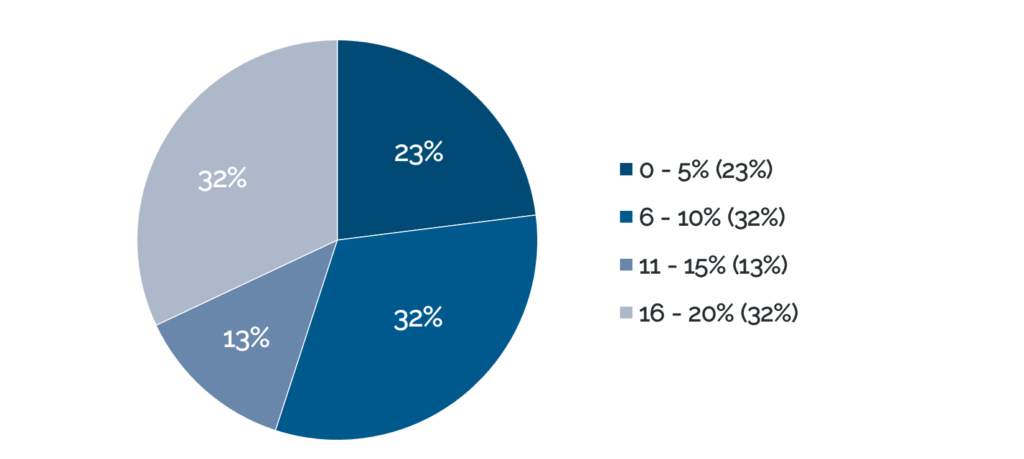BFP #OpenLP Series (9) – Recycling has proven to be good for the environment, but fund recycling also appears to be beneficial for the performance of PE & VC funds.
At BFP we are currently investigating fund recycling and the perspective of GPs on this topic.
We analysed data from approximately 60 US funds with a vintage from 2010 to 2015 to examine how many of them have managed to reinvest some of their fees and to what extent.
“There is really not much downside on recycling” (Michael Jackson)
The three main takeaways are:
- Only 49% of the funds managed to reinvest any of their fees and thus increased the chance of higher gains.
- Of this 49%, 68% recycle less than 15%, which is an amount lower than the fees
- Beyond this, during our research we also found out that in Europe recycling is a much less common practice
For the funds that recycle, the chart below displays the amount of capital recycled as a share of the total fund size.

The Advantage of Fund Recycling
“Recycling is giving good investors more shots to make money” (Michael Jackson)
The main reason why GPs should recycle is that recycling improves the performance of a fund. Without it, a Manager needs a significantly stronger capital efficiency in order to achieve the same results.
Let´s take an example. A fund has a size of $100M, 2% management fees and a target Net TVPI of 4x:
- Without Recycling: If the manager does not recycle, the invested capital would be $80M ($100 * 2% * 10years). In order to return a 4x Net TVPI from a $100m fund, the manager has to return to its LPs $400m. Given that the manager will receive a carried interest equal to 20% of the gain of the fund, then he/she will have to generate a total value of 475 = 100 + 300 / 80%. Therefore, to return 4x Net, a Manager needs to achieve a Multiple of Invested Capital of 5.93x = 475 / 80.
- With Recycling: If the manager recycles the fees [1], the invested capital would be $100M, which means that to generate the same value (475) and the same return (4x Net), he/she will have to achieve a Multiple of Invested Capital of 4.75x, which is significantly lower than the 5.93x without recycling.
The challenge of executing
However, if fund recycling improves performance, why do only 49% of the Managers reinvest capital, and why so conservatively? The problem is that recycling in practice is not so simple. There are basically two ways to do it:
- Reinvesting proceeds from early exits
- Delaying management fees and pay the GPs with proceeds later on in the cycle
On an execution level, the following problems arise:
- Proceeds from early exits can not be forecasted in advance
- In case of reinvesting management fees, the GP might lack capital to fund operations, which becomes especially challenging for first time funds
- With recycling, LPs receive distributions at a later point in time, meaning that GPs would show lower DPIs when raising their new fund
Fund Recycling in Europe
In order to obtain further information about recycling, BFP had the chance to discuss the topic with Michael Jackson [2], who recently published an interesting post about fund recycling.
“Recycling is more common in the US compared to Europe. VC firms in North America often have agreements with their LPs allowing them to recycle up to 115-120% of the fund.
Certain LPs in Europe all too frequently seem more concerned with minimising their downside exposure than in maximising their upside, but as an LP you should believe in the GPs you invest in, particularly in an asset class like venture.
Another issue is that some European LPs don’t necessarily prioritise returns – it could be question of tax benefits for example. In addition, venture in Europe has historically been seen as an economic development tool rather than as an asset class”.
—
About Christina Senn
Christina is currently working as an Intern at BFP within the venture capital team. Prior to that she has gained experience in consulting and completed her Master studies at ESCP Business School in Madrid and her Bachelor studies at Munich Business School. Christina has discovered her passion for venture capital and is eager to learn more. She is pursuing a career in this industry and is happy to connect with people and build a network.
About BFP
BFP is a Fund of Funds with decades worth of investing experience in Venture Capital. We specialize in backing Emerging Managers focused on early-stage technology investments. We are people-centric and relationship-driven. We have a global mandate and existing relationships with Emerging Managers in the US, Europe, Israel, China, and South East Asia.
References
[1] Distinction between overcommitment strategy and recycling: An overcommitment strategy refers to fund of funds and means that the fund of funds is committing to a fund a total amount of capital which is higher than its total fund size, assuming the liquidity gap will be filled by distributions from the fund.








